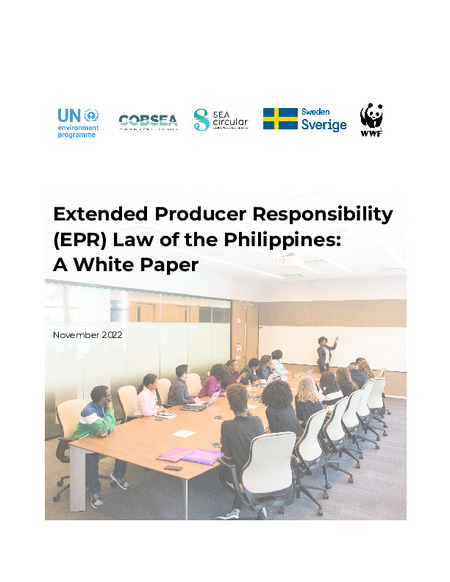| dc.contributor | Asia & Pacific Office | en_US |
| dc.contributor.author | WWF Philippines | en_US |
| dc.contributor.other | | en_US |
| dc.coverage.spatial | Philippines | en_US |
| dc.date.accessioned | 2023-02-16T07:26:59Z | |
| dc.date.available | 2023-02-16T07:26:59Z | |
| dc.date.issued | 2022-11 | |
| dc.identifier.uri | https://wedocs.unep.org/20.500.11822/41846 | |
| dc.description | EPR is an environmental policy approach that encourages plastic waste reduction through (1) the elimination of unnecessary plastic packaging of products; (2) the development of more environmentally friendly and recyclable packaging design; and (3) the recovery of plastic packaging from the trash in order to reuse them or recycle them back into the production process. This White Paper aims to highlight the importance of implementing an Extended Producer Responsibility (EPR) scheme that is inclusive, integrative, and impactful for reducing plastic pollution. In the Philippines, the EPR law emerged as a supplement and amendment to the existing law, Republic Act (RA) 9003, or the Ecological Solid Waste Management Act of 2000. | en_US |
| dc.format | pdf | en_US |
| dc.language | English | en_US |
| dc.relation.ispartof | Extended Producer Responsibility (EPR) Law of the Philippines | en_US |
| dc.relation.ispartof | SEA Circular | en_US |
| dc.rights | Public | en_US |
| dc.subject | plastic waste | en_US |
| dc.subject | producer liability | en_US |
| dc.subject | Philippines | en_US |
| dc.title | Extended Producer Responsibility (EPR) Law of the Philippines: A White Paper | en_US |
| wd.identifier.sdg | SDG 3 - Good Health and Well-Being | en_US |
| wd.identifier.sdg | SDG 16 - Peace, Justice and Strong Institutions | en_US |


